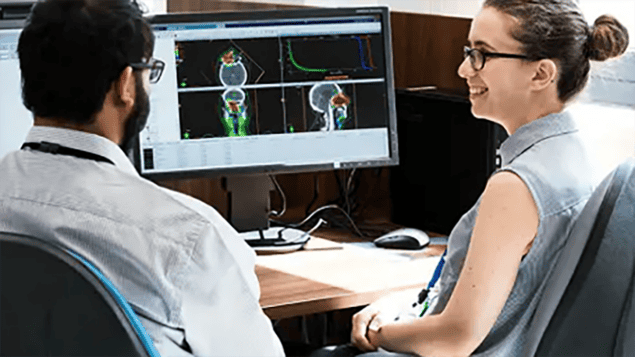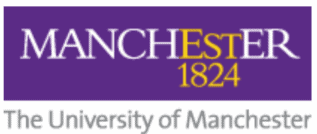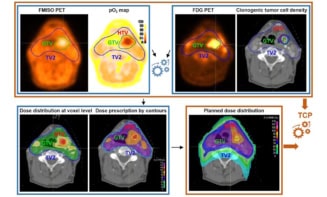The new Medical Physics in Cancer Radiation Therapy master’s joins a suite of postgraduate courses at the University of Manchester that have been designed to allow students to learn from our experts in cancer research and specialize in this growing sector

The programme focuses on the cancer radiation therapy patient pathway, with the aim of equipping students with the skills to progress onto careers in clinical, academic research or commercial medical physics opportunities.
Alan McWilliam, programme director of the new course, is also a reader in translational radiotherapy physics. He explains: “Radiotherapy is a mainstay of cancer treatment, used in around 50% of all treatments, and can be used together with surgery or systemic treatments like chemotherapy or immunotherapy. With a heritage dating back over 100 years, radiotherapy is now highly technical, allowing the radiation to be delivered with pin-point accuracy and is increasingly interdisciplinary to ensure a high-quality, curative delivery of radiation to every patient.”
“This new course builds on the research expertise at Manchester and benefits from being part of one of the largest university cancer departments in Europe, covering all aspects of cancer research. We believe this master’s reflects the modern field of medical physics, spanning the multidisciplinary nature of the field.”
Cancer pioneers
Manchester has a long history of developing solutions to drive improvements in healthcare, patients’ lives and the wellbeing of individuals. This new course draws on scientific research and innovation to equip those interested in a career in medical physics or cancer research with specialist skills that draw on a breadth of knowledge. Indeed, the course units bring together expertise from academics that have pioneered, amongst other work, the use of image-guided radiotherapy, big data analysis using real-world radiotherapy data, novel MR imaging for tracking oxygenation of tumours during radiotherapy, and proton research beam lines. Students will benefit directly from this network of research groups by being able to join research seminars throughout the course.
Working with clinical scientists
The master’s course is taught together with clinical physicists from The Christie NHS Foundation Trust, one of the largest single-site cancer hospitals in Europe and the only UK cancer hospital connected directly to a research institute. The radiotherapy department currently has 16 linear accelerators across four sites, an MR-guided radiotherapy service and one of the two NHS high-energy proton beam services. The Christie is currently one of only two cancer centres in the world with access to both proton beam and an MR-guided linear accelerator. For students, this partnership provides the opportunity to work with people at the forefront of cancer treatment developments.
To reflect the current state of radiotherapy, the University of Manchester has worked with The Christie to ensure students gain the skills necessary for a successful, modern, medical physics career. Units have a strong clinical focus, with access to technology that allows students to experience and learn from clinical workflows.
Students will learn the fundamentals of how radiotherapy works, from interactions of X-rays and matter, through X-ray beam generation control and measurement, and to how treatments are planned. Complementary to X-ray therapy, students will learn about the concepts of proton beam therapy, how the delivery of protons is different from X-rays, and the potential clinical benefits and unique difficulties of protons due to greater uncertainties from how protons interact with matter.
Delivering radiation with pin-point accuracy
The course will provide an in-depth understanding of how imaging can be used throughout the patient pathway to aid treatment decisions and guide the delivery of radiation.
The utility of CT, MRI and PET scanners across clinical pathways is explored, and the area of radiation delivery is complemented by material on radiobiology – how cells and tissues respond to radiation.
The difference between the response of tumours and normal tissue to radiation is called the therapeutic ratio. The radiobiology teaching will focus on how to maximize this ratio, essentially how to improve cure whilst minimising the risk of side-effects due to irradiation of nearby normal tissues. Students will also explore how this ratio could be enhanced or modified to improve the efficacy of all forms of radiotherapy.
Research and technology
A core strength of the research groups in Manchester is the use of routinely collected data in the evaluation of improvements in treatment delivery or the clinical translation of research findings. Many such improvements do not qualify for a full randomized clinical trial. However, there are many pragmatic methods to evaluate clinical benefit. Through studying clinical workflows and translation, these concepts will be explored along with investigating how to maximise results from all available data.
Modern medical physicists need an appreciation of artificial intelligence (AI). AI is emerging as an automation tool throughout the radiation therapy workflow; for example, segmentation of tissues, radiotherapy planning and quality assurance. This course delves into the fundamentals of AI and machine learning, giving students the opportunity to implement their own solution for image classification or image segmentation. For those with leadership aspirations, guest lecturers from various academic, clinical or commercial backgrounds will detail career routes and how to develop knowledge in this area.
Pioneering new learning and assessments
Programme director Alan McWilliam talks us through the design of the course and how students are evaluated:
“An aspect of the teaching we are particularly proud of is the design of the assessments throughout the units. Gone are written exams, with assessments allowing students to apply their new knowledge to real medical physics problems. Students will perform dosimetric calculations and Monte Carlo simulations of proton depositions, as well as build an image registration pipeline and pitch for funding in a dragon’s den (or shark tank) scenario. This form of assessment will allow students to demonstrate skills directly useful for future career pathways.”
“The final part of the course is the research project, to take place after the taught elements are complete. Students will choose from projects which will embed them with one of the academic or clinical groups. Examples for the current cohort include training an AI segmentation model for muscle in CT images and associating this with treatment outcomes; simulating prompt gamma rays from proton deliveries for dose verification; and assisting with commissioning MR-guided workflows for ultra-central lung treatments.”
Develop your specialist skills
The Medical Physics in Cancer Radiation Therapy MSc is a one-year full-time (two-year part-time) programme at the University of Manchester.
Applications are now open for the next academic year, and it is recommended to apply early, as applications may close if the course is full.
Find out more and apply: https://uom.link/medphyscancer




